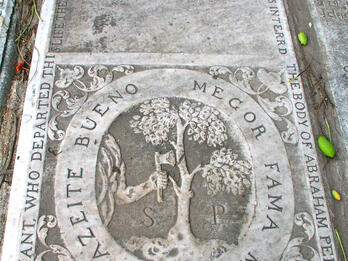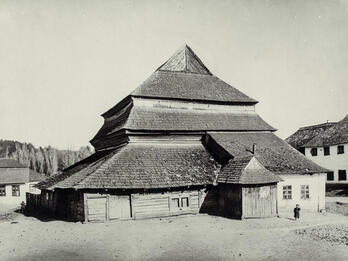Shemen ha-tov u-zekan Aharon (The Goodly Oil and the Beard of Aaron)
There was once a little city with few Jewish inhabitants, roughly twenty households, the name [of the city] being Ragusa; and it was self-governing. Now it transpired that in the year 5383 [1622], on the first day of Sukkot, a rumor was heard in the city that the daughter of a certain gentile, one of the merchants of the city, had gotten lost—and a search was made for her, but she could not be found. [ . . . ] And then, during the night, the father of the girl went together with several men, the guardians of the walls, out of the city to conduct a search throughout all the environs of the city [ . . . ] and they proceeded from house to house until they entered the home of a certain gentile woman, who was a wicked individual and a perpetrator of evil deeds, and carried out a search of her house; and underneath her bed, they found the girl slain, curled up inside her shabby, worn-out garments. [ . . . ]
There then came a certain man, from among the gentile inhabitants of the country, alongside the others who had arrived, and said to her, “Perhaps it was the Jews who taught you to slay this little girl, to celebrate their festival with her blood?” And those words entered into her system like the poison of a snake. Then they brought her to the vestibule of the courthouse. And this accursed woman [ . . . ] chose to adopt what that gentile had said to her, namely that it is the practice of the Jews to do this on their festivals and appointed seasons. Indeed, she responded to the judges likewise by declaring, “What I did was on account of my having been ordered to do so by a certain Jew!” Now as she was acquainted with one Jew only, by the name of Isaac Yeshurun, due to the fact that he held in his possession one of her garments by way of pledge against a loan by him of fifty dinars, the equivalent of one real, she declared that this was the Jew who had ordered her to slay this little girl.
And then the chief judges instantly dispatched officers to close up the entrance to the Jews’ neighborhood, known as the “Ghetto,” and they summoned the aforementioned Isaac, and he was brought before the chief judges. Then they placed him in front of that accursed woman so that she should make her allegation directly; and the two of them argued together concerning this. And when the aforementioned Isaac saw that there was a woman coming to confront him [ . . . ], Isaac trembled exceedingly in regard to that false allegation, and said, “Far be it from me to do anything of that sort, and there is no truth in what she says!” [ . . . ]
On the third day after his arrest, they subjected him to sufferings, which are known in the gentiles’ language as “torture”; that is to say, they tied his hands behind his back and suspended him there in the air by them—so that he remained in a suspended position for one hour. And in addition, during that hour, they hoisted him twenty cubits off the ground, and subsequently released the rope so that he instantly fell onto his hands which were suspended in the air, and his limbs and his entire body were dismembered. And they did this to him three times during that hour. [ . . . ] And all this they did to him in order to coerce him, in order that, as a result of those tortures, he would say that it was he who ordered the woman to commit that evil deed. [ . . . ] And so they determined by means of a vote to subject him to further chastisement, and they carried out yet another torture for one hour, in the same manner as before, on the seventh day after his arrest, when his former pain and immense suffering as a result of what they had done to him initially had not yet gone away [ . . . ]; and before they suspended him, they shaved his hair, as they said, “He is a magician, and that is the reason for his having been able to bear and withstand the pain initially inflicted upon him, without revealing anything.” And all the while this poor man was shouting in a bitter voice, weeping and crying out, “I am finished!” But no response was forthcoming. [ . . . ]
And on the twentieth day after his arrest, they subjected him to even greater sufferings than he had endured on the first two occasions, [ . . . ] and the men marveled, one to another, for they said, “How is it humanly possible to withstand such a great amount of suffering without admitting to the matters sought from him?” [ . . . ] And then they put the aforementioned Isaac in a deep dungeon [ . . . ] and allowed him just a single window of approximately three hand-breadths in height, so as to pass him his meals. [ . . . ]And thus he was wounded on account of their transgressions, suffering wounds and bruises and festering sores, [ . . . ] and on top of everything else, his hands and his arms were dislodged from their sockets—for as a result of the numerous suspensions and bindings, and the vindictive acts to which his persecutors had subjected them, they were wrenched from their normal positions and sensation of them became entirely obliterated, so that he was rendered incapable of feeling them, like the flesh of a corpse. [ . . . ]
We hired a certain gentile to feed him and give him to drink. And this is what that gentile would do: he would take a lengthy wooden stick and place the food upon it, little by little, and then extend it toward him through the cavity, whereupon the aforesaid Isaac would take it into his mouth, and consume it, in the same way as the ox licks up the grass of the field. And insofar as giving him to drink was concerned: he would take a wooden pipe and stretch it out in a forward direction, whereupon the aforesaid Isaac would place his mouth in the inner rim of the pipe while the gentile poured out the liquor, little by little, from the outside, and he would take it into his mouth. And he had to do all this because the wall in which the cavity was contained was extremely deep, so that no human being’s hand would be able to reach the inner end of it to feed him.
And this poor man, while he remained there powerless to care for himself, was filled with stench, and his body exuded sores on the skin and countless numbers of lice, to the point where he became weary of his life. But the Almighty hearkened to him on this occasion too, and sent forth His Word, which healed him without recourse to medicines. The Holy One, blessed be He, simply designated for him a cat, which came to him and which he trained to lie on his arms. And the Almighty rendered him assistance, with the result that, after one month had elapsed, he was able to feel sensation in his hands and to feed his body once again—at which all who heard of this marveled, as they were unaware of its cause. [ . . . ] And after two years and eight months had elapsed, the Almighty, blessed be He, put an end to the darkness, and they consented [ . . . ] to free him and let him go out of the city. And they forthwith opened the dungeon for him and destroyed the building. And we went to him—that is to say, all the Jews—to give thanks to the Lord for all the good that He had done unto us, and for the wondrous things He had wrought, as no one had imagined that he would ever get out of there again.
Credits
Aaron ben David ha-Kohen, Shemen ha-tov u-zekan Aharon (The Goodly Oil and the Beard of Aaron) (Venice, 1657).
Published in: The Posen Library of Jewish Culture and Civilization, vol. 5.




